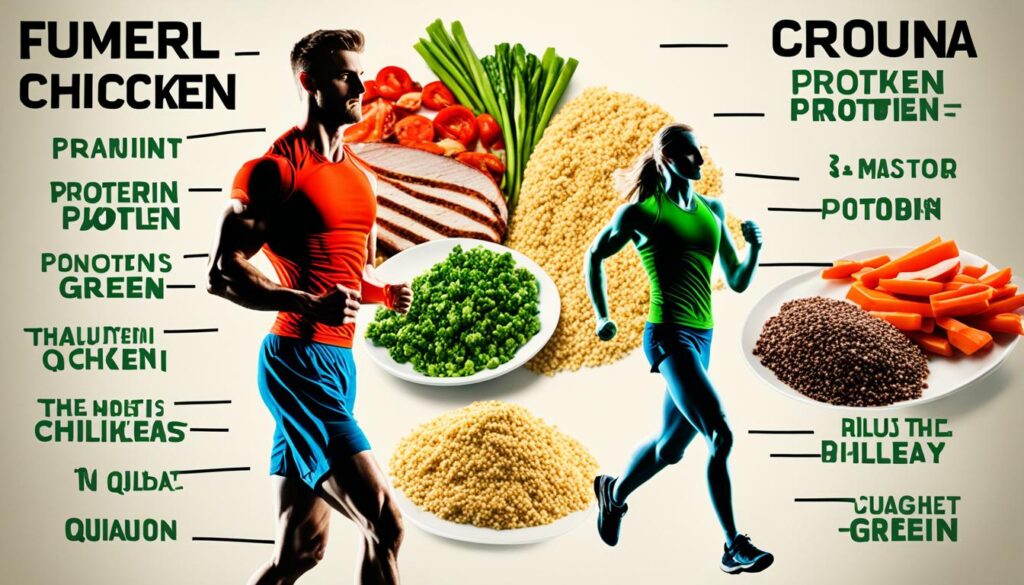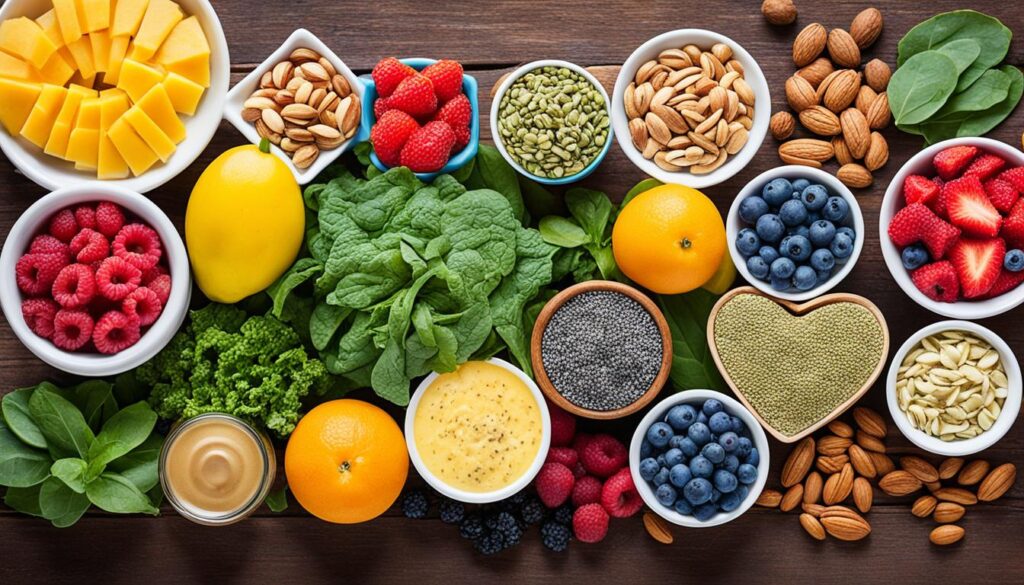In the realm of endurance sports, a staggering 60% of runners are not meeting their daily protein requirements, thwarting their potential for optimal muscle repair and post-run replenishment. This shortfall in protein intake is not just a gap in nutrition—it’s a barrier to achieving peak performance and swift recovery for runners at all levels. Understanding the benefits of protein intake for runners is like discovering the missing piece of the puzzle that can transform an average run into a triumphant sprint towards health and vitality.
The journey to recovering faster and performing better doesn’t end at the finish line—it starts with a tailored protein strategy. Protein serves as the building block of muscle tissue, contributing to crucial processes such as injury prevention, immune function, and red blood cell production, the vehicles that oxygenate your strides. But how much protein is enough? Studies suggest a range of 0.5 to 0.9 grams of protein per pound of body weight per day to suit the varying degrees of intensity and duration among running aficionados. Striking that delicate balance in your protein intake for running recovery not only fuels your next expedition but also lays the foundation for stronger and more resilient performances.
Embrace the protein paradigm and elevate your running regimen. Dive into our comprehensive guide to discover how to consummate your sprints, marathons, and everything in-between with the power of protein.
The Role of Protein in Runners’ Health and Performance
The discussion on nutrition for endurance athletes often centers around carbohydrates and fats for energy, but the importance of protein should not be understated. For distance runners, protein is not just a nutrient, it is the building block for a body resilient against the wear and tear of miles logged. Optimal protein intake for endurance athletes goes beyond muscle repair; it also underpins vital physiological functions integral to performance.
Understanding the Importance of Protein for Runners
At the heart of a runner’s protein intake is not the pursuit of bulk but the maintenance of a finely tuned machine. Protein is important for distance runners because it provides the components needed to repair muscle fibers damaged during exercise. This underscores not just recovery, but the very capability to endure repeated physical challenges.
How Protein Contributes to Tissue Repair and Immune Function
When athletes think of recovery, muscle synthesis often comes to mind first. However, immune function support should also be a priority, as constant training can put a strain on the immune system. Protein serves as a critical nutrient to bolster immunological defenses, enabling runners to stay healthy and ready for the next run.
The Science Behind Protein and Oxygen-Carrying Red Blood Cells
Yet another critical role of protein for runners is its involvement in hemoglobin production, a component of red blood cells. Hemoglobin’s role in oxygen transportation is crucial, especially for distance runners whose workouts depend heavily on aerobic, oxygen-utilizing metabolic pathways. Thus, a well-planned protein intake is paramount for sustaining aerobic performance over longer distances.
| Protein’s Impact on Runners | Short-Term Benefits | Long-Term Health and Performance |
|---|---|---|
| Muscle Repair | Speed up recovery post-run | Rebuild stronger muscle fibers for endurance |
| Immune Function | Reduce risk of post-exercise illness | Maintain a robust immune response amidst heavy training |
| Oxygen Transport | Enhance oxygen delivery during runs | Improve aerobic capacity and endurance performance |
In sum, protein’s multifaceted contribution to a runner’s health and performance is undeniable. By ensuring an optimal protein intake, endurance athletes can reinforce their recovery, guard their health, and extend their physical limits – all of which are key ingredients for prolonged success in the realm of distance running.
Calculating Your Protein Needs as a Runner
For runners striving to maximize their performance and recovery, understanding how to calculate runner protein needs is essential. Unlike the standard Recommendation for Dietary Allowance (RDA), which may fall short for highly active individuals, runners require a fine-tuned approach to their protein intake – particularly when engaging in intense training. This is where the expertise of a registered dietitian for athletes becomes invaluable, as they can help tailor nutrition plans to the specific needs of runners.

- Personalized assessment of daily protein requirements based on training intensity and frequency.
- Guidance on balancing protein with other nutrients for optimal performance.
- Support with meal planning to ensure protein needs are met through whole foods and supplements if necessary.
- Resources and education on appropriate portion sizes and timing of protein intake around workouts.
Contacting a professional through reliable organizations such as the Academy of Nutrition and Dietetics can lead to a deeper understanding of nutrition and its impact on running efficacy. Runners can access a wealth of resources and find registered dietitians in their area through these sports nutrition experts.
Discovering your unique protein needs not only supports your training goals but also helps in harnessing the full strength of your running potential. Involve a qualified dietitian in your journey to calculate your runner protein needs accurately, ensuring your dietary habits propel you towards your ultimate athletic achievements.
Optimizing Protein Intake for Various Running Distances
Whether you sprint through the 100 meters or endure the 26.2 miles of a marathon, your body’s protein needs will differ significantly. Understanding and optimizing your protein intake can be the cornerstone of your training, recovery, and overall running performance.
Short-Distance Runners and Protein Requirements
Short-distance runners typically put their focus on speed and power. Consequently, their protein needs are more about maintaining muscle quality rather than quantity. For those specializing in short bursts of powerful activity, the protein requirements align with consuming roughly half their body weight in grams of protein each day. This approach supports muscle recovery and replenishes energy without excess that might go unused.
Protein Intake Recommendations for Endurance Runners
Endurance runners, on the other hand, cover greater distances and require prolonged energy expenditure. These athletes often need protein intake closer to their full body weight in grams to prevent their bodies from utilizing muscle mass as fuel during long training sessions or races. Adequate protein consumption for these runners is critical to sustaining endurance and stamina for the long haul.
Below is a detailed table on protein intake tailored for runners by distance:
| Runner Type | Distance | Recommended Protein Intake (g of protein/day) |
|---|---|---|
| Short-Distance Runner | 100 – 400 meters | 0.5 x Body Weight (lb) |
| Mid-Distance Runner | 800 – 3000 meters | 0.6 – 0.8 x Body Weight (lb) |
| Endurance Runner | 5000 meters – Marathon | Up to 1.0 x Body Weight (lb) |
For precision in meeting your protein needs, listen to your body and adjust according to how you feel during and after runs, taking into account factors like intensity and recovery times. If in doubt, consulting with a sports nutritionist can provide personalized guidance for your short-distance running protein needs or endurance running protein consumption.
Whole Foods vs. Supplements: Best Sources of Protein for Runners
For runners looking to maintain their health and performance, understanding the optimal sources of protein is paramount. Natural, whole foods typically offer a symphony of nutrients, including high-quality proteins that are essential to a runner’s diet. However, when the rigors of training demand more, supplements can play a supporting role in a runner’s protein intake.
The Benefits of Whole Foods for Meeting Protein Needs
Emphasizing whole foods in your diet not only provides a diverse range of proteins but also delivers other essential nutrients and vitamins. This synergistic effect can enhance overall health and aid in recovery and muscle rebuilding after strenuous runs.

Animal-based protein sources, such as lean poultry, fish, dairy, and eggs, are packed with all the essential amino acids that the body cannot produce on its own. Including these in your meals ensures a comprehensive amino acid profile crucial for muscle repair and recovery for runners.
Lean Meats, Dairy, and Eggs: High-Quality Protein Sources
- Chicken breast: A lean source that’s low in fat and high in protein
- Grilled salmon: Offers omega-3 fatty acids along with protein
- Low-fat Greek yogurt: A versatile dairy product that blends well in smoothies or parfaits
- Eggs: Convenient and affordable, boasting a perfect biological value for protein
Plant-Based Proteins: What Runners Need to Know
For runners following a plant-based diet or looking to diversify their protein sources, several plant-based options can fit the bill. While plant-based protein for runners can sometimes miss essential amino acids, incorporating a variety of sources can provide a complete protein intake throughout the day.
| Plant-Based Protein Source | Primary Nutrients | Serving Size & Protein Content |
|---|---|---|
| Lentils | Fiber, Iron | 1 cup cooked (18g protein) |
| Quinoa | Magnesium, Phosphorus | 1 cup cooked (8g protein) |
| Almonds | Healthy fats, Vitamin E | 1 ounce (6g protein) |
| Chickpeas | Folate, Manganese | 1 cup cooked (15g protein) |
In instances where dietary requirements are heightened or specific nutritional goals are not being met through food alone, protein supplements, like Ensure Max Protein, can provide an effective alternative for meeting those stringent protein-rich foods for runners demands.
Timing Your Protein Consumption for Peak Recovery
When it comes to maximizing your running performance and accelerating muscle repair, understanding post-run protein timing is just as critical as the workout itself. Beyond the mere act of consumption, the synchronization of protein intake plays a pivotal role in the body’s ability to replenish and fortify itself after a strenuous run.
Adhering to antioxidant-rich recovery nutrients within the much-touted ‘golden hour of recovery’ allows runners to capitalize on the heightened absorption rates that follow physical exertion. Ideally, athletes should aim to consume a recovery meal or snack that delivers between 15 to 30 grams of high-quality protein soon after they cool down. This practice not only starts repairing microtears in muscle tissue but also replenishes critical glycogen stores, paving the way for stronger subsequent performances.
Remember, the window for optimizing recovery doesn’t swing shut after sixty minutes; it gradually closes. Thus, eating protein-rich foods or a protein shake immediately to an hour post-run ensures that the body has the necessary building blocks ready to undertake the vital repair and growth processes.
Pairing this protein intake with appropriate hydration and a balance of other macros enhances the efficiency of the recovery process. Below is a brief guide to help encapsulate the optimal mix of nutrients immediately following a run:
| Timing | Protein (grams) | Carbohydrates | Fluids (oz) |
|---|---|---|---|
| 0-30 min post-run | 15-25 | High-quality, easily digestible | 16-24 |
| 30-60 min post-run | 10-20 | Complex, fiber-rich | Additional 8-16 |
In summary, the precise post-run protein timing can significantly influence recovery speed and efficacy. This targeted approach not only fortifies the physical strength needed for running but also enhances overall well-being, ensuring that runners are ready to hit the pavement for their next challenge fully rejuvenated.
Debunking Myths: Will Protein Make Runners Bulky?
When it comes to long-distance running and recovery, the balance of protein intake is pivotal. The misconception that protein, particularly in the form of protein supplements for recovery, leads to unwanted bulk in runners is far from accurate. Let’s uncover the truths behind muscle mass and how it actually enhances running performance.
Protein Intake and Muscle Mass: Separating Fact from Fiction
The image of the bulky bodybuilder often pops into mind when we think of high protein diets, but for runners, this image doesn’t hold up. Runners lean towards a more sculpted physique due to the nature of their aerobic training. A higher protein intake, especially aided by supplements, supports muscle repair without necessarily increasing muscle size. It’s all about recovery and preparing the body for the next training session with the least amount of downtime—leading to consistency and improvement in endurance and pace.

The Relationship Between Protein and Body Composition for Runners
Running is an activity that predominantly builds lean muscle and boosts cardiovascular health, quite different from the type of hypertrophy – or muscle building – associated with bodybuilding. Protein aids in preserving and repairing the muscle tissue that is broken down during runs. This repair does not equate to bulk but rather a more defined muscle mass and better running economy. Shadows of doubt may linger, but the evidence is clear: a runner’s agility and speed come from a well-conditioned, functionally lean muscle mass that is supported by the proper uptake of protein.
Rather than fearing an increase in size, runners should embrace protein—a macronutrient that fuels recovery and strengthens muscle fibers, potentially enhancing running performance. It bridges the gap between simply covering miles and improving how each step propels a runner forward. When used strategically, protein, particularly in supplements designed for recovery, can be a game-changer in a runner’s nutrition regimen.
Choosing the Right Protein: What You Need to Consider
When selecting the best protein for running, it’s not just about looking for high-protein content; it is also about considering the quality, digestibility, and the comprehensive amino acid profile that can cater to a runner’s recovery needs. Comprehension of these factors is vital in making an informed decision about your recovery protein sources.
Animal proteins usually provide a complete set of amino acids, which are the building blocks of proteins. However, vegan and vegetarian runners are also in luck, as many plant-based proteins offer these essential nutrients.
- Fermented soy products, like tempeh and miso, not only bring variety to the table but also enhance gut health, vital for nutrient absorption.
- Nuts, while providing healthy fats, also contribute a generous amount of protein and the necessary calories needed for endurance running.
- Quinoa, a unique plant-based option, contains all nine essential amino acids and is gluten-free, making it a versatile protein component for runners with specific dietary preferences.
| Protein Source | Amino Acid Profile | Quality & Digestibility |
|---|---|---|
| Fermented Soy Products | Complete | High |
| Nuts (Almonds, Walnuts) | Varies by Type | Medium to High |
| Quinoa | Complete | High |
As a runner, your protein intake is imperative not just for muscle repair but for your overall health and performance. By selecting the right protein sources, you can ensure your body gets the best possible support for recovery and strength, propelling you forward in your running journey.
Navigating Protein Supplementation for Runners
When training ramps up or dietary limitations prevent adequate consumption of protein, runners can encounter a protein deficit which may impair recovery and performance. Understanding the role of protein shakes and supplementation can bridge this nutritional gap.
When and Why to Consider Protein Shakes
In the life of a runner, the convenience and efficiency of protein shakes for runners serve as their primary appeal. These nutritional aids are especially helpful for those struggling to consume enough protein through their regular diet or those who experience the high demands of endurance training. The quick and efficient delivery of amino acids to the muscles post-run can be a game-changer in achieving swift recovery.

Ensuring Adequate Protein Intake with Supplements
While whole foods should ideally provide the bulk of a runner’s protein, supplements offer a strategic tool to ensure protein supplementation benefits such as prevented muscle fatigue and sustained energy levels during long runs. For those unable to meet their intake through meals alone, supplementation can be instrumental in maintaining muscle integrity and promoting post-exercise repair.
- Convenience for on-the-go nutrition
- Precision in protein quantity
- Supplemental source for a balanced diet
Consider the following table as a guide to determine if protein supplementation may benefit your running regimen:
| Runner Profile | Dietary Protein Intake | Recommended Protein Supplementation |
|---|---|---|
| Long-Distance Runner | Below recommended range | Post-run shakes, daily protein bars |
| Vegetarian/Vegan Runner | Lacking complete proteins | Plant-based shakes, amino acid supplements |
| Runner with High-Intensity Training | Adequate but requires quick replenishment | Immediate post-workout shake |
| Recreational Runner | Meets or exceeds recommended intake | Minimal to no supplementation necessary |
Balancing a runner’s hectic schedule with their nutritional needs can be challenging. Incorporating protein shakes for runners can significantly alleviate a protein deficit in runners, safeguarding against the potential derailing effects it can have on training and overall health.
Post-Run Protein Strategies: Practical Tips and Ideas
Understanding the right way to fuel your body post-run is critical for optimal recovery and performance. Incorporating practical protein intake advice is not just influential, it is a cornerstone of any effective post-run replenishment protocol. Let’s explore some easily adaptable strategies to help support muscle repair and recovery after your training sessions.
- Blend a high-protein smoothie combining Greek yogurt, fruits, and a handful of spinach or kale for an antioxidant boost.
- Opt for a recovery shake that includes a balance of proteins and carbohydrates to replenish energy stores and aid in muscle recovery.
- Prepare a lean chicken breast with quinoa and mixed vegetables to provide a solid meal rich in protein and essential nutrients.
- Snack on cottage cheese with pineapple or berries for a quick and tasty protein-rich snack.
Following these practical tips will not only aid in muscle recovery but will also ensure you’re energized and ready for your next run. Remember, the foundation of your post-run recovery starts with the fuel you provide your body.
| Protein Source | Quantity | Protein Content |
|---|---|---|
| Greek Yogurt (Nonfat) | 1 cup | 23g |
| Protein Shake (Whey) | 1 scoop | 20-25g |
| Chicken Breast | 3 oz | 26g |
| Cottage Cheese | 1/2 cup | 14g |
| Quinoa | 1 cup | 8g |
The importance of practical protein intake advice should not be underestimated. Not only does it guide you toward smarter nutrition choices, it sets the stage for your body’s ability to heal and strengthen after each run. Tailored post-run replenishment helps ensure that every step you take contributes to your fitness goals and running journey.
Understanding Protein Intake for Injury Prevention and Recovery
The significance of protein in a runner’s diet transcends mere muscle building; it is a cornerstone in injury prevention and a paramount factor in recovery. By embracing the importance of protein after running, enthusiasts and professional athletes alike can substantially mitigate the risk of injuries that could sideline their progress. Moreover, for those recovering from injuries, a strategic protein intake for injury recovery emerges as a pivotal element in accelerating the healing process, ultimately leading to a triumphant return to the trails or track.
The Connection Between Protein and Reduced Injury Risk
Runners are often susceptible to injuries due to the repetitive stress placed on muscles and joints. A diet fortified with adequate protein contributes to stronger muscle fibers and connective tissues, enhancing overall resilience. It isn’t merely about consuming protein; it’s about understanding when and how to replenish your body with this vital nutrient to build a shield against potential injuries.
Protein’s Role in Post-Injury Recovery for Runners
Recovery is a journey that starts at the cellular level. Following an injury, proteins act as the building blocks that repair and reconstruct damaged tissues, speeding up the recovery period. The integration of a high-protein diet post-injury ensures a steady supply of amino acids which are crucial for tissue regeneration and recovery—helping runners not just to heal but to come back stronger.
Undoubtedly, a runner well-fueled with protein is set on a path toward a more sustainable and resilient athletic tenure. With an informed approach to protein consumption, the runner’s playbook is well-equipped to tackle the inevitable challenges of endurance sports—assuring that every stride is not just a step towards the finish line but also towards a stronger and healthier body.
Conclusion
The journey to achieving peak performance for runners is multifaceted, with nutrition taking a central stage. A strategic approach to protein intake stands out as a game-changer in the realm of athletics, particularly for runners whose bodies demand constant recovery and strengthening. Embracing effective post-run protein strategies not only catalyzes recovery but also propels runners to noteworthy heights in their performance. This spectrum of benefits underscores the value of protein as not just a nutrient, but as a pillar in the construction of a runner’s resilience and achievement.
Through meticulous attention to dietary habits and leveraging the enhancing power of protein, runners can significantly reduce the risk of injury. This prudent management of protein consumption goes further than immediate post-exercise replenishment; it builds a foundation of enduring muscle health which, in turn, contributes to sustained, injury-free running experiences. Therefore, the role of protein transcends beyond the short-term horizon—it weaves into the very fabric of a runner’s long-term progression and success.
Ultimately, runners who prioritize and fine-tune their protein intake set themselves on a trajectory for greater endurance, faster recovery times, and a robust defense against the toll of high-impact activities. Integrating protein-rich foods and supplements as part of a thoughtfully constructed nutritional regimen is a testament to the athlete’s dedication to not only meet but exceed their running aspirations. For runners aiming for the apex of their abilities, nurturing their bodies through calculated protein strategies is a testament to the elegance of science harmonizing with the spirit of sport.


2 Comments
Submit a Comment